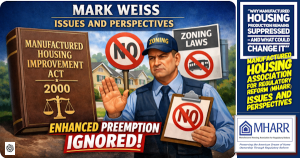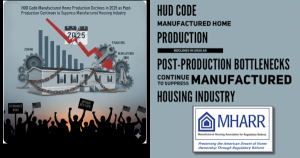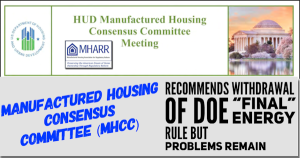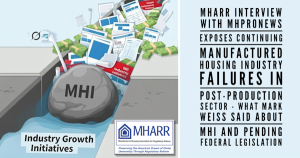Biden Administration Regulatory Executive Orders
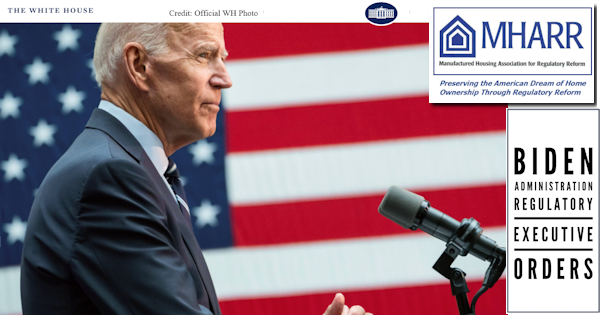
The Biden Administration, as expected, has issued a flurry of executive orders (EOs) and related directives in its first hours, including several pertaining to federal regulatory matters that will have both direct and indirect impacts on the regulation of HUD Code manufactured housing. While MHARR is in the process of developing a comprehensive analysis of these actions and their implications for both the manufactured housing industry and American consumers of affordable housing, the following is a list of the most significant executive actions undertaken thus far by the Biden Administration and the most immediate effects that they will likely have in the short term on the federally regulated manufactured housing industry:
- Executive Order on Revocation of Certain Executive Orders Concerning Federal Regulation
This Executive Order immediately revokes Trump Administration EOs which sought to reduce and/or eliminate burdensome regulations on American businesses. These include Executive Order 13771 of January 30, 2017 (“Reducing Regulation and Controlling Regulatory Costs”) and Executive Order 13777 of February 24, 2017 (“Enforcing the Regulatory Reform Agenda”), which together formed the express basis for HUD’s so-called “top-to-bottom” review of existing HUD manufactured housing standards and regulations. Regulatory reform proposals submitted to HUD pursuant to that “review” were analyzed, considered and, in significant part, recommended for HUD adoption by the statutory Manufactured Housing Consensus Committee (MHCC) throughout 2019, but were never finalized or even published as proposed rules by HUD. Given the slow-down of these reforms within HUD during 2020, it is now highly unlikely that any significant program reforms will ensue, particularly insofar as the Biden EO instructs the “Office of Management and Budget and the heads of agencies [to] promptly take steps to rescind any orders, rules, regulations, guidelines, or policies, or portions thereof, implementing or enforcing” either EO 13771 or 13777, while it simultaneously abolishes “any personnel positions, committees, task forces, or other entities established pursuant to … Executive Orders [13771 and 13777] … including the regulatory reform officer positions and regulatory reform task forces established by sections 2 and 3 of Executive Order 13777….”
In addition, the Biden EO rescinds Trump Administration EO 13891 of October 9, 2019 (“Promoting the Rule of Law Through Improved Agency Guidance Documents”) and EO 13892 of October 9, 2019 (“Promoting the Rule of Law Through Transparency and Fairness in Civil Administrative Enforcement and Adjudication”), which sought to curb the misuse and abuse of agency “guidance” documents to establish new regulatory burdens in violation of the Administrative Procedure Act (APA) and, in the case of manufactured housing, section 604 of the Manufactured Housing Improvement Act of 2000. As previously documented by MHARR, both Trump Administration “guidance” EOs were similarly slowed down within HUD, with the result that the only HUD manufactured housing program “actions” rescinded pursuant to EO 13891 and 13892 through the end of the Trump Administration were 13 meaningless editions of the Office of Manufactured Housing Programs’ (OMHP) newsletter.
- Executive Memorandum on Modernizing Regulatory Review
This executive action instructs the Director of OMB, in “consultation” with federal agency heads to, “as soon as practicable,” begin “a process with the goal of producing a set of recommendations for improving and modernizing regulatory review.” Those recommendations, according to the Biden directive, “should provide concrete suggestions on how the regulatory review process can promote public health and safety, economic growth, social welfare, racial justice, environmental stewardship, human dignity, equity, and the interests of future generations.” The directive further states that these “recommendations should also include proposals that would ensure that regulatory review serves as a tool to affirmatively promote regulations that advance these values.” (Emphasis added). It should be noted that this directive is prospective only. Thus, absent any further steps by the new administration, such review will not be applied to existing rules, only to proposed new regulations subject to review by OMB. Nor does this directive alter the purposes or substantive provisions of federal manufactured housing law.
Insofar as mainstream HUD Code manufactured housing – as the nation’s premiere source of affordable homeownership for all Americans, and particularly lower and moderate-income families – affirmatively promotes eachof the above-stated objectives of this directive, this new directive could be cited as a basis for ongoing MHARR efforts to preserve, promote defend and maintain the inherent affordability of HUD Code homes with the new Administration. Further, the modern indoor manufacturing technology employed by the industry for the production of today’s manufactured homes (i.e., indoor, controlled construction techniques which limit pollution and waste), fully complies with the ideals of sound environmental stewardship. That said, however, the amorphous terminology and concepts referenced in the directive have the potential to be abused if not properly developed, stated, and applied by OMB. Therefore, MHARR will continue to closely monitor developments relating to this directive and will seek opportunities to provide relevant, factual and accurate input concerning its implementation for the benefit of the entire industry and its consumers.
- Executive Memorandum on Regulatory Freeze Pending Review
This memorandum to agency heads from the White House Chief of Staff, directs them to pause any pending regulatory actions until they are reviewed and approved by a Biden Administration appointee. In relevant part the memorandum, similar to a directive issued by President Trump upon taking office, instructs federal agencies to: “propose or issue no rule in any manner — including by sending a rule to the Office of the Federal Register (the “OFR”) — until a department or agency head appointed or designated by the President after noon on January 20, 2021, reviews and approves the rule.” As defined by the memorandum, covered “rules” include a wide array of both regulatory and pseudo-regulatory actions, including “guidance” documents and advance notices of proposed rulemaking. Consequently, this pause will impact activity on HUD’s December 12, 2020 Advance Notice of Proposed Rulemaking concerning manufactured housing program payments to the states and possibly could delay slightly the implementation of HUD’s so-called “third set” of manufactured housing standards revisions which were recently published in the Federal Register and are slated to go into effect on March 15, 2021. Beyond these matters, the pause directive could also potentially affect other pending actions by HUD or other agencies concerning manufactured housing that have not yet been published in the Federal Register. MHARR will closely monitor developments affecting this pause and related matters, and will act accordingly.
We will continue to keep you apprised with factual and accurate information as these matters continue to evolve.
The Biden Administration, as expected, has issued a flurry of executive orders (EOs) and related directives in its first hours, including several pertaining to federal regulatory matters that will have both direct and indirect impacts on the regulation of HUD Code manufactured housing. While MHARR is in the process of developing a comprehensive analysis of these actions and their implications for both the manufactured housing industry and American consumers of affordable housing, the following is a list of the most significant executive actions undertaken thus far by the Biden Administration and the most immediate effects that they will likely have in the short term on the federally regulated manufactured housing industry:
- Executive Order on Revocation of Certain Executive Orders Concerning Federal Regulation
This Executive Order immediately revokes Trump Administration EOs which sought to reduce and/or eliminate burdensome regulations on American businesses. These include Executive Order 13771 of January 30, 2017 (“Reducing Regulation and Controlling Regulatory Costs”) and Executive Order 13777 of February 24, 2017 (“Enforcing the Regulatory Reform Agenda”), which together formed the express basis for HUD’s so-called “top-to-bottom” review of existing HUD manufactured housing standards and regulations. Regulatory reform proposals submitted to HUD pursuant to that “review” were analyzed, considered and, in significant part, recommended for HUD adoption by the statutory Manufactured Housing Consensus Committee (MHCC) throughout 2019, but were never finalized or even published as proposed rules by HUD. Given the slow-down of these reforms within HUD during 2020, it is now highly unlikely that any significant program reforms will ensue, particularly insofar as the Biden EO instructs the “Office of Management and Budget and the heads of agencies [to] promptly take steps to rescind any orders, rules, regulations, guidelines, or policies, or portions thereof, implementing or enforcing” either EO 13771 or 13777, while it simultaneously abolishes “any personnel positions, committees, task forces, or other entities established pursuant to … Executive Orders [13771 and 13777] … including the regulatory reform officer positions and regulatory reform task forces established by sections 2 and 3 of Executive Order 13777….”
In addition, the Biden EO rescinds Trump Administration EO 13891 of October 9, 2019 (“Promoting the Rule of Law Through Improved Agency Guidance Documents”) and EO 13892 of October 9, 2019 (“Promoting the Rule of Law Through Transparency and Fairness in Civil Administrative Enforcement and Adjudication”), which sought to curb the misuse and abuse of agency “guidance” documents to establish new regulatory burdens in violation of the Administrative Procedure Act (APA) and, in the case of manufactured housing, section 604 of the Manufactured Housing Improvement Act of 2000. As previously documented by MHARR, both Trump Administration “guidance” EOs were similarly slowed down within HUD, with the result that the only HUD manufactured housing program “actions” rescinded pursuant to EO 13891 and 13892 through the end of the Trump Administration were 13 meaningless editions of the Office of Manufactured Housing Programs’ (OMHP) newsletter.
- Executive Memorandum on Modernizing Regulatory Review
This executive action instructs the Director of OMB, in “consultation” with federal agency heads to, “as soon as practicable,” begin “a process with the goal of producing a set of recommendations for improving and modernizing regulatory review.” Those recommendations, according to the Biden directive, “should provide concrete suggestions on how the regulatory review process can promote public health and safety, economic growth, social welfare, racial justice, environmental stewardship, human dignity, equity, and the interests of future generations.” The directive further states that these “recommendations should also include proposals that would ensure that regulatory review serves as a tool to affirmatively promote regulations that advance these values.” (Emphasis added). It should be noted that this directive is prospective only. Thus, absent any further steps by the new administration, such review will not be applied to existing rules, only to proposed new regulations subject to review by OMB. Nor does this directive alter the purposes or substantive provisions of federal manufactured housing law.
Insofar as mainstream HUD Code manufactured housing – as the nation’s premiere source of affordable homeownership for all Americans, and particularly lower and moderate-income families – affirmatively promotes eachof the above-stated objectives of this directive, this new directive could be cited as a basis for ongoing MHARR efforts to preserve, promote defend and maintain the inherent affordability of HUD Code homes with the new Administration. Further, the modern indoor manufacturing technology employed by the industry for the production of today’s manufactured homes (i.e., indoor, controlled construction techniques which limit pollution and waste), fully complies with the ideals of sound environmental stewardship. That said, however, the amorphous terminology and concepts referenced in the directive have the potential to be abused if not properly developed, stated, and applied by OMB. Therefore, MHARR will continue to closely monitor developments relating to this directive and will seek opportunities to provide relevant, factual and accurate input concerning its implementation for the benefit of the entire industry and its consumers.
- Executive Memorandum on Regulatory Freeze Pending Review
This memorandum to agency heads from the White House Chief of Staff, directs them to pause any pending regulatory actions until they are reviewed and approved by a Biden Administration appointee. In relevant part the memorandum, similar to a directive issued by President Trump upon taking office, instructs federal agencies to: “propose or issue no rule in any manner — including by sending a rule to the Office of the Federal Register (the “OFR”) — until a department or agency head appointed or designated by the President after noon on January 20, 2021, reviews and approves the rule.” As defined by the memorandum, covered “rules” include a wide array of both regulatory and pseudo-regulatory actions, including “guidance” documents and advance notices of proposed rulemaking. Consequently, this pause will impact activity on HUD’s December 12, 2020 Advance Notice of Proposed Rulemaking concerning manufactured housing program payments to the states and possibly could delay slightly the implementation of HUD’s so-called “third set” of manufactured housing standards revisions which were recently published in the Federal Register and are slated to go into effect on March 15, 2021. Beyond these matters, the pause directive could also potentially affect other pending actions by HUD or other agencies concerning manufactured housing that have not yet been published in the Federal Register. MHARR will closely monitor developments affecting this pause and related matters, and will act accordingly.
We will continue to keep you apprised with factual and accurate information as these matters continue to evolve.

